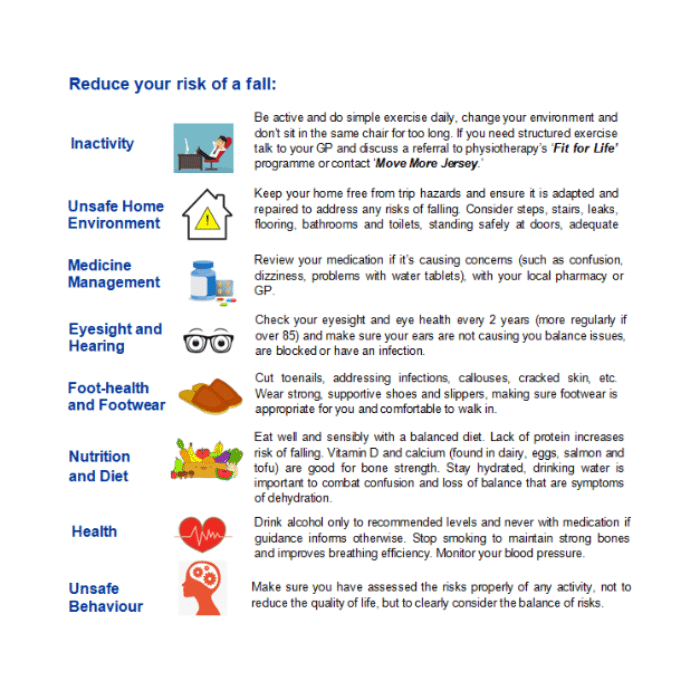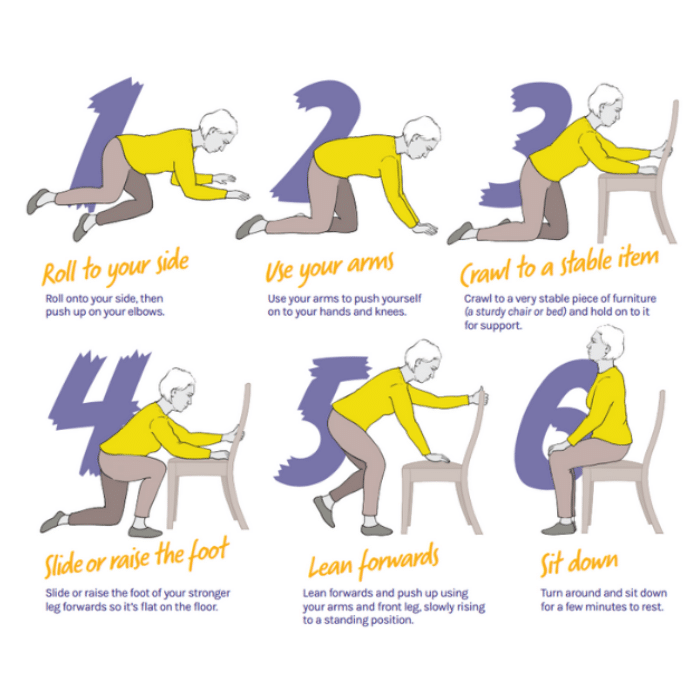
Reduce your risk of a fall
If you’re wondering what you can do about falling or if you are concerned about a loved one who may be at risk of falling, follow the ‘Reduce your risk of a fall’ practical advice.
Falling is a risk for everyone, with age increasing the likelihood. According to the World Health Organization (2021), a fall is defined as “An incident causing an individual to unintentionally come to rest on the ground, floor, or a lower level.” Among adults over 65, there’s a 30% annual fall rate, and if they fall once, there’s a 70% risk of more falls the following year. Suffering from frailty doubles the risk of falling and related injuries present a significant healthcare concern.
The physical impact of falls include:
The psychological impact of falls include:
Over the past year, Jersey experienced a high incidence of fall-related issues, resulting in 537 hospital admissions (8.2% of all Emergency Department admissions), 2,249 ambulance calls (18% of total calls), more than 51 hip fracture admissions costing over £2,013,990, and a total of 7,292 hospital bed days due to falls (2022 data).
Frailty is often misunderstood. It describes a person’s mental and physical resilience, referring to their ability to bounce back from illness and injury (Age UK, 2020). People with frailty live in a state of vulnerability, teetering on the brink of decompensation, and even minor illnesses or trauma can have a significant impact.
Preventing and reversing frailty involves various interventions, including exercise, nutrition, and social support. Among these, exercise stands out as particularly effective, enhancing muscle strength, balance, and overall physical function. These efforts are essential for promoting extended independent living, reducing the reliance on emergency care and long-term support, and ultimately preventing hospital admissions and related patient complications (British Geriatric Society, 2023).
To address falls or concerns for a loved one at risk, prioritise open communication and support. Encourage risk assessment, a balanced diet, professional advice, and consult the ‘Get up and go’ booklet for guidance to maintain independence and prevent crises.

If you’re wondering what you can do about falling or if you are concerned about a loved one who may be at risk of falling, follow the ‘Reduce your risk of a fall’ practical advice.
Nutritional status is an independent predictor of falls in older people in the community. Improvement of nutritional status has been found to reduce the risk of falling.
See more information on Age UK and in the Get up and Go leaflet about diet. But also in Eat for healthy bones – NHS advice. Seek professional advice if you are concerned about your diet, talk to your GP.
Sitting for extended periods can also slow circulation and make your joints feel stiff, increasing the risk of falls when you stand. Try these simple seated activities to loosen up in the morning before you start your day:
Jersey faces an increasing old-age dependency challenge (PwC, 2021) and the increasing population size equals more older people with frailty and increased falls risk.
The annual rise in hospital admissions for falls, combined with limited public awareness and understanding of frailty, highlights the need for early frailty detection. The impact of frailty and falls, worsened by reactive and fragmented services, highlights the importance of comprehensive education for both the public and healthcare professionals.
For frequent fallers, proactive planning helps. Keep cushions and blankets nearby for head support and warmth (without creating tripping hazards). Ensure easy access to water for staying hydrated. Always wear an emergency pendant to enable help to be called.
If you have fallen, stay still and calm for a minute, and check for injuries. If you are unhurt you can get up using a sensible and supportive strategy. A carer can help you with this, but you need to be in control. Allow time to regain bearings, staying calm, getting over the shock, and working out what’s possible. Ensure you assess the situation, and only get up if you are satisfied there are no injuries.
Move More Jersey provide classes suitable for our aging population:
Fit For Life is a 12 week exercise programme that will work on improving your balance, strength, cardiovascular fitness and flexibility. They adapt each exercise to each individual and allow you to work at your own pace.

If you have fallen, stay still and calm for a minute, and check for injuries.
Allow time to regain bearings, staying calm, getting over the shock, and working out what’s possible. Assess the situation, only getting up if you are satisfied there are no injuries.
If you are unhurt you can get up using a sensible and supportive strategy. A carer can help you with this, but you need to be in control. Ensure that you follow the 6-step approach to get up from a fall.
Providing Help